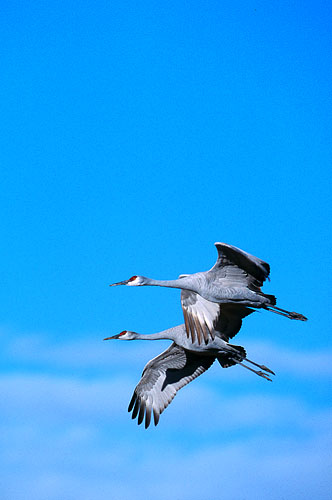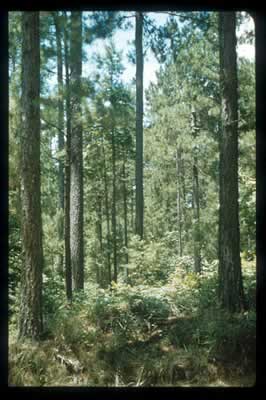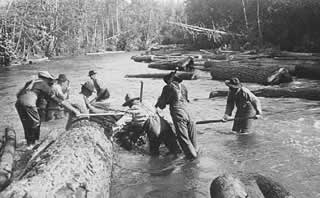|
|
Canku Ota |
|
|
(Many Paths) |
||
|
An Online Newsletter Celebrating Native America |
||
|
February 22, 2002 - Issue 81 |
||
|
|
||
|
C.H. Cooke's Diary of a Trip Up the Chippewa River in 1868; Indians Wary in Trading |
||
|
From: Eau Claire Telegram December
16, 1917
(Third of Four Installments) |
||
|
Note - This is the
third installment of diary kept by C. Cooke, now of Mondovi, when, he
Professor Shadrach A. Hall, and George Sutherland made a canoe trip
up the Chippewa River in the spring 1868.
|
||
|
It was Sunday morning, and lovely as the first morning when everything was new, the topmost branches in the lordly pines were singing their hymns to Diana and her train, as they gently swayed in the passing breeze. There was something in it, as the professor well said, to chime with the spirit of the day. To tell the whole truth, every truth every day, in such a place is Thanksgiving Day to me. They are all divine. The professor is a stickler for puritan observance of the day and insisted that we remain in camp until the morrow. A little bit against his wishes George and I visited some Indians camped on the shore and were visited by them in return. We found they had a lot of maple sugar and on telling them of our goods they wanted to see them before making a trade, so this morning, Monday, they came over, bringing two squaws with them and some fancy birch work and baskets of sugar to exchange for traps and calico. They were a rather difficult crowd to deal with, very suspicious. I could not blame them. They have gradually been crowded back from one reservation to another, promised that each move would be their last, until they have come to have no faith in the white race. What a strange mixture of right and wrong there is in the Christian Age after all. In every one of their dark faces there was a look of resentment. They seldom smile. It's a strange policy for a so-called Christian nation, this doing as we are doing. We make a great ado over the Ten Commandments and the Sermon on the Mount, and yet in despoiling the Indian of his home we violate the principles of both. It's a great problem after all. The Indian's habits are so unlike ours, they cannot mix with us, nor can we mix with them. The only thing to do, it would seem, if we are to occupy this continent, is to drive them into the sea or blend the two races by intermarriage. Pass
Deserted Indian Village The boys are itching to see me get a fall in the river. The professor has been in twice, attempting to ride logs, and Sutherland once. They are rascally enough, as I believe, to use a bit of force, if it could be done in a roundabout way.
About four in the afternoon we reached Grand Rapids and made a portage of a half-mile, which took us two hours. We decided not to camp again; it was so near dark, and pitched our tent for the night under some of the tallest pines without a limb nearer than fifty feet of the ground. Feeling
of Pioneers "There
is a pleasure in the pathless woods, The professor dropped his stick from poking the fire and clapped his hands, in which I joined, as did George some moments later, after getting the professor's opinion that it would be in perfect good taste for him to do so. Curiously enough, a lot of crows overheard, winging their silent way across the river, observing us and startled, no doubt, by our clapping, set up a chorus of cawing, protest or approval, we were uncertain which. Bird
Life We kept up a blazing fire of pine knots, the refuse of the forest for ages, so the professor assured us, and after a lot of chat of sense and nonsense until 10 o'clock turned in for the night. Some loons in a lake nearby kept up their cry in accents so human in tone for an hour as to murder sleep. Spares
Cranes Had the five cranes taken wing from the opposite shore and come over and alighted near me, I am not sure at that I should have harmed them. I am sure they would have been perfectly safe. I was a moment absorbed in boyhood days and in pleasing memories of my crane companions. Happily the five cranes did not share my feeling and in less time than I am this reminiscent story they had take flight at their most fearsome enemy and after repeated cries of alarm they spread their great wings and wearily rising above the pines took a northward course, guided by instinct, or by God, or whatever you will. I ate the remains of the breakfast while I recited that which I had seen and recalled my boyhood. Both George and the professor merely smiled. If I had not told them of my pet cranes and my boyhood, I am sure they would have made light of my skill as a hunter coming home without any game.
A sprinkling of elm and maple mark some interruption to the pine the current of the river is getting stronger again and rather to our hindrance. Despite currents and any element of discouragement our seal showed no abatement. Every day is still divine. I had some fear that the captain, that is the professor, might flinch when put to the test of rugged camp, but he meets every test without a whimper. George, of course, like myself, has the elasticity of youth, always ready for any fate. Water is water, but water with a stiff current and water without current are vastly different things. The rapids we met and over came today are known as the "Nine Mile Rapid." It was an incessant pull that took both muscle and patience. One blunder we made that cost us a lot of time and work was, in dodging into a friendly slough to escape meeting a swift current, only to find after paddling for an hour or so that its' head was full of logs. A lot of ducks were seen overhead, but no chance to get any. Most of them were teal and they flew high. We took this as a sign that lakes were scarce in this neighborhood of the river. The Indians had told us we would see few ducks save in the vicinity of lakes. The water in the river is receding, showing that the snow had all melted and unless we soon had rains the log drives would soon be tied up. Indians'
Sugar Camp We had a late start this morning, held back by the appearance of a coming storm. The current was again strong and our progress slow. The rapids continued with us. The water is some three feet above the usual stage. About noon in trying to make the ascent of the rapid water about four feet deep, our boat suddenly shot cross ways of the river, and almost upsetting the whole business. The boat careened so far that my revolver, shot pouch, powder, coat and some traps were spilled in the water. I regained my coat, which contained my purse, but the rest of the stuff amounting to some $15 was lost.
We went into camp early on what seemed a shore frequented by the Indians. Hardwood timber seemed to predominate and the chipper of squirrels promised some shooting. George mended leaks in our boat and the professor made camping provisions for the night and I struck out for game. I bagged two partridges and a squirrel and after riddling a porcupine with shot returned to camp. The storm so threatening in the morning had cleared away. The sunset was a golden promise of a fine tomorrow. A skinning our squirrel and birds and salting them for breakfast and finishing our rather frugal meal of bread and maple syrup we gathered about our camp fire and listened to the professor tell a lot about the stars, the motion of planets, etc., the subject drifted as if by mutual agreement onto the subject of the morrow's movements. After a rather protracted discussion it was agreed that we would remain in camp were we were another day and night, and then if the spirit persisted that our movement be forward and onward we should continue towards the head of the river. In this frame of mind we "doused the glom" and rolled in. |
|
|
||
|
|
||
| Canku Ota is a free Newsletter celebrating Native America, its traditions and accomplishments . We do not provide subscriber or visitor names to anyone. Some articles presented in Canku Ota may contain copyright material. We have received appropriate permissions for republishing any articles. Material appearing here is distributed without profit or monetary gain to those who have expressed an interest. This is in accordance with Title 17 U.S.C. section 107. | ||
|
Canku Ota is a copyright © 2000, 2001, 2002, 2003 of Vicki Lockard and Paul Barry. |
||
 |
 |
|
|
The "Canku Ota - A Newsletter Celebrating Native America" web site and its design is the |
||
|
Copyright © 1999, 2000, 2001, 2002, 2003 of Paul C. Barry. |
||
|
All Rights Reserved. |
||
 Sandhill
Cranes
Sandhill
Cranes Unbroken
Wall of Pines
Unbroken
Wall of Pines Logs
Threatened Wreck
Logs
Threatened Wreck